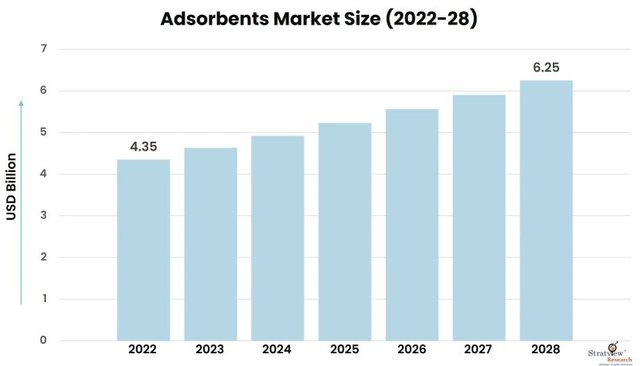The Future of the Adsorbents Market: Growth Projections and Insights for 2028
The global adsorbents market is positioned for significant growth over the next decade, driven by increasing environmental concerns, advancements in material science, and the rising demand for clean air and water. Adsorbents, substances that attract and hold molecules of gases or liquids on their surface, play a critical role in industrial processes, environmental cleanup, and even consumer products. As industries across the globe prioritize sustainability, the adsorbents market is expected to expand substantially by 2028. Here, we explore the key factors that will drive this growth and offer insights into what the future holds for the market.
According to Stratview Research, the adsorbents market was estimated at USD 4.35 billion in 2022 and is likely to grow at a CAGR of 6.21% during 2023-2028 to reach USD 6.25 billion in 2028.

1. Growing Demand for Water and Air Purification
One of the major drivers of the adsorbents market is the increasing need for water and air purification. As industrialization and urbanization continue to accelerate, pollution levels in air and water are on the rise, prompting governments and corporations to invest in solutions that reduce contaminants. Adsorbents such as activated carbon, zeolites, and silica gels are widely used in water treatment plants and air purification systems. By 2028, as regulations become stricter and public demand for clean water and air increases, the adsorbents market is expected to witness robust demand.
2. Innovations in Adsorbent Materials
Technological advancements in adsorbent materials are also driving market growth. The development of high-performance adsorbents, including metal-organic frameworks (MOFs) and carbon nanotubes, has opened up new applications and markets. These materials offer superior adsorption capacities and selectivity, making them ideal for specialized industrial processes such as gas separation, petrochemical production, and even carbon capture. As research continues and manufacturing processes become more efficient, these advanced adsorbents are likely to see wider adoption, further boosting market expansion by 2028.
3. Rising Demand for Sustainable and Green Solutions
Sustainability will be a key factor shaping the future of the adsorbents market. Industries are increasingly seeking environmentally friendly alternatives to traditional methods of filtration and purification. Adsorbents, particularly those made from renewable resources or designed for reuse and regeneration, align with the global push for sustainable solutions. As businesses and governments ramp up their environmental efforts, the demand for adsorbents that reduce waste, energy consumption, and harmful emissions will continue to rise.
4. Expanding Industrial Applications
Apart from water and air purification, adsorbents play a crucial role in industries such as petrochemicals, pharmaceuticals, and food processing. Their versatility in applications like odor removal, solvent recovery, and even oil spill clean-ups makes them indispensable across multiple sectors. As industries grow and innovate, the need for efficient and cost-effective adsorbent solutions will drive further market growth.
Conclusion
The adsorbents market is poised for substantial growth by 2028. Driven by environmental concerns, advancements in material technology, and increasing industrial demand for sustainable solutions, the future of the adsorbents market is promising. As the world continues to prioritize environmental protection and efficient resource use, adsorbents will play a crucial role in shaping cleaner, more sustainable industrial processes globally.